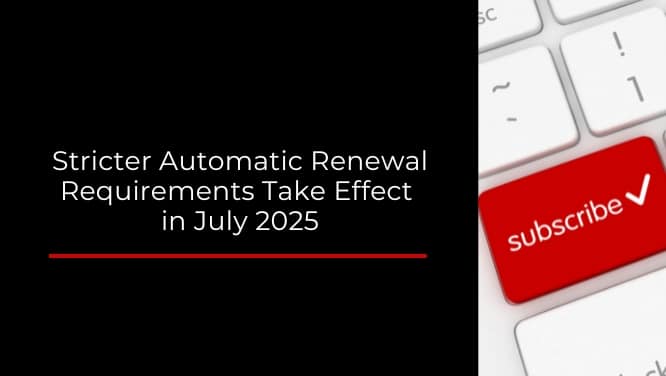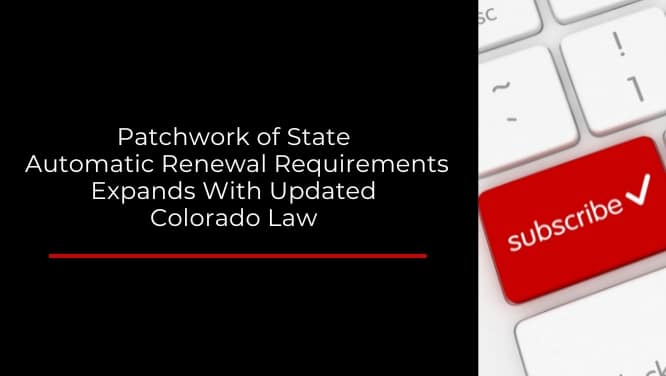Stricter California Automatic Renewal Requirements Take Effect in July 2025

- KO Firm
- |
- July 29, 2025
Amendments to California’s Automatic Renewal Law (ARL) took effect on July 1, 2025, introducing stricter requirements for businesses offering autorenewal or continuous service subscriptions. California’s updated ARL was initially expected to coincide with the Federal Trade Commission’s updated Negative Option Rule (commonly referred to as the “Click-to-Cancel Rule”), which was scheduled to take effect on July 14, 2025. However, the FTC’s Click-to-Cancel Rule was recently struck down by a federal court and will not go into effect as planned.
This makes California’s enhanced ARL even more significant for companies operating subscription-based businesses, especially those serving California consumers. The California ARL applies to contracts with California consumers (B2C sales) and aims to increase consumer transparency and control over subscription-based services by preventing hidden autorenewals, surprise charges, and barriers to cancellation.
California’s ARL and other state ARLs have unique and nuanced requirements for consent, cancellations, and notifications. Businesses serving customers across the United States must ensure that their practices align with these overlapping federal and state regulations, which often have nuanced requirements for consent, cancellations, and notifications.
The key requirements under the California ARL are as follows:
- Express Affirmative Consent. Sellers must get separate, explicit agreement to autorenewal terms. Customers must click “I agree” or check a box confirming the subscription will automatically renew. From a practical standpoint, sellers must add an additional unchecked checkbox or separate consent button tied specifically to renewal terms that is in addition to an unchecked checkbox (or similar button/means of affirmative assent) for agreement to the general terms of service. Under the California ARL, businesses must retain proof of consent for the longer of three years or one year after cancellation.
- Same‑Medium Cancellation. Customers must be able to cancel the subscription using the same method they used to sign up. For example, online subscribers must be able to cancel online; phone subscribers need a toll-free cancellation line. Cancellation must be as straightforward as enrollment.
- “Click to Cancel” and Save Offers. When offering discounts to retain customers, businesses must provide a clear “Click to Cancel” (or similarly worded) link or button that immediately stops renewal. For phone cancellations, inform customers they can cancel by saying “cancel” before pitching retention offers. No hidden obstacles or repetitive confirmation screens are allowed.
- Advance Notices of Changes. The California ARL also requires businesses to notify customers at least 7 days and no more than 30 days before changing subscription terms (e.g., price increases). This notice must include the new price and cancellation instructions.
- Annual Renewal Reminders. Businesses are also required to send annual notifications for all autorenewal plans, even monthly subscriptions. This reminder must include the product/service name, pricing, billing frequency, and cancellation instructions.
- No Misrepresentations. The California ARL also prohibits misleading statements and misrepresentations about subscriptions as well as about the underlying good or service.
- Other Rules Remain. Previous requirements under California law, FTC rules, and other state ARLs still apply (e.g., clear disclosure of terms before checkout, post-purchase confirmation with cancellation instructions, and no pre-checked boxes).
Subscription billing with autorenewals can drive recurring revenue, but regulators have made it clear: consumers (and even business customers) must not be “trapped” in unwanted contracts. As of July 2025, there are additional contractual requirements for sellers using autorenewals. For many of our clients, this means investing effort now to redesign your subscription experience for transparency and simplicity and to ensure that records of customer consent are maintained for the applicable time period.
With the FTC’s Click-to-Cancel Rule now off the table (at least for the time being), California’s ARL may serve as a de facto national standard for many businesses. When in doubt, you should align your practices with the strictest requirements that apply to your company. Taking these steps now minimizes legal risk, curtails chargebacks, builds customer trust, and helps you “future-proof” against future changes to state ARLs.
For tailored guidance on implementing these requirements—or auditing your current flows—please contact your primary KO attorney or reach out to us at [email protected].




